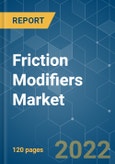The friction modifiers market is projected to register a CAGR of over 3% during the forecast period (2021-2026).
The market was negatively impacted by COVID-19 in 2020. Friction modifiers are additives that are mainly used in lubricants of the automotive industry. Owing to the pandemic scenario, the passenger air traveling facility was temporarily stopped during the lockdown, and even after the lockdown, people were not opting to travel frequently through airlines or personal vehicles. Thus, this led to a decrease in the consumption of aviation lubricants, as well as automobile lubricants, which, in turn, negatively impacts the demand for lubricant additives like friction modifiers.
Key Highlights
- Over the short term, increasing applications for fuel-efficient lubricants are expected to drive the market's growth.
- The declining automotive industry, growing usage of electric vehicles, and the negative impact of the COVID-19 pandemic are expected to hinder the market's growth.
- The Asia-Pacific region is expected to dominate the market, and it is also likely to witness the highest CAGR during the forecast period.
Key Market Trends
Increasing Usage in the Industrial Sector
- Friction modifiers are additives that are commonly used in lubricant applications to reduce the coefficient of friction and improve lubricity and energy efficiency in machines.
- Friction modifiers are also called boundary lubrication additives. Esters, fatty acids, and other solid materials such as graphite and molybdenum are used for friction reduction purposes.
- Inorganic friction modifiers are in high demand and are being used for different industrial applications. According to the National Bureau of Statistics of China, Chinese industrial production was increased by about 2.4% in 2020 compared to the previous year. Furthermore, the industrial production was increased by 7.3% year-on-year in December 2020, following an increase of 7% year-on-year in the previous month, thus led to an increase in the demand for friction modifiers for various industrial applications.
- Friction modifiers are added to lubricants that are being used in internal combustion engines and transmissions. Key applications of friction modifiers include automatic and manual transmissions, hydraulic systems, shock absorbers, and metalworking applications.
- Friction modifier properties help in reducing friction and increase fuel efficiency, and it can also prevent metal scoring, reduce engine wear and noise, and help to prevent micropitting of metal surfaces when used in industrial gear lubricants.
- In 2019, the mining, quarrying, and manufacturing sector of 27 member countries of the European Union (EU-27) accounted for total production sales of about USD 5,915.87 billion. The annual average industrial production for the year 2020, compared with 2019, fell by 8.7% in the euro area (EU-16) and by 8% in the EU (EU-27).
- The impact of the COVID-19 in every region led to a shutdown in production and manufacturing units. Due to this, there is an estimated decrease in the usage and demand for friction modifiers from different sectors in recent times.
- Therefore, the aforementioned factors are expected to show a significant impact on the market in the coming years.
Asia Pacific Region to Dominate the Market
- Asia-Pacific is expected to dominate the global market owing to the highly developed automotive sector in China, India, and Japan, coupled with the marine and industrial sectors in the region in recent years.
- Asia-Pacific is the largest lubricant consumer in the region and the world, followed by Europe. The outbreak of COVID-19 has affected the economic growth of all the countries at present, as almost all the manufacturing and service sectors have been halted due to lockdown.
- The expansion of the marine industry in Asia-Pacific is expected to increase the demand for friction modifiers. According to Marine Insight, South Korea, China, and Japan are leading countries in the production and usage of various ships for different purposes.
- According to the OICA, Asia-Pacific dominated global automobile production in recent years. China is the largest producer of automobiles globally, with a production volume of 25.75 million vehicles in 2019 and reached 25.23 million vehicles in 2020, registering a decline rate of about 2%. Thus, this led to a slight decrease in the consumption of lubricants, which, in turn, negatively impacts the market demand for friction modifier additives.
- Friction modifiers also help the aerospace sector in increasing fuel efficiency. The aerospace industry in Asia-Pacific witnessed decent growth in the previous years. Due to this, there was more usage of friction modifiers in this region. According to Boeing, about 25% of world air travel is flown within Asia as of the year 2019, and it is forecasted that the value will change to 35% of world total air travel in the next two decades, contributing the highest share of intra-regional air travel globally. The Asia-Pacific region will get 17,390 deliveries of new airplanes in the next two decades (between 2019 and 2038), which will increase the total number of airplane fleets to 19,420.
- Indian domestic scheduled airlines carried 63 million passengers in 2020, with a decline rate of 57% compared to the previous year.
- Therefore, the aforementioned factors are expected to show a significant impact on the market in the coming years.
Competitive Landscape
The friction modifiers market is partially consolidated in nature, with few major players competing in the market. Some of the major companies are BASF SE, Croda International PLC, Afton Chemical, ADEKA CORPORATION, and Chevron Corporation, among others.
Additional Benefits:
- The market estimate (ME) sheet in Excel format
- 3 months of analyst support
This product will be delivered within 2 business days.
Table of Contents
Companies Mentioned (Partial List)
A selection of companies mentioned in this report includes, but is not limited to:
- ABITEC
- ADEKA CORPORATION
- Afton Chemical
- BASF SE
- BRB International
- Chevron Corporation
- Croda International PLC
- CSW Industrials Inc.
- The Lubrizol Corporation
- Multisol
- Royal Dutch Shell PLC
Methodology

LOADING...








